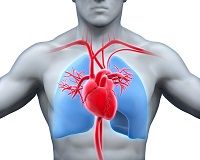Article
Heart Disease Risk Increased with Rheumatoid Arthritis
Author(s):
Heart disease risk is increased with the presence of rheumatoid arthritis.

Risk of heart attack is increased in patients with rheumatoid arthritis (RA) even without symptoms, according to a poster presentation at the International Conference on Nuclear Cardiology and Cardiac CT on May 4, 2015 in Madrid, Spain.
Researchers from the National Medical Centre in Mexico City, Mexico examined 91 patients with RA with traditional cardiovascular risk factors, but no symptoms of heart disease in order to assess the presence of ischemia and infarction secondary to atherosclerotic disease (coronary artery disease). The patients were assessed for inflammatory markers, RA disease activity, and risk factors. The investigators also observed the existence of ischemia and infarction using a nuclear cardiology method called Gated Single Photon Emission Computed Tomography (SPECT).
“RA affects 1.6% of the general population and is the first cause of consultation in the rheumatology service,” Adriana Puente, a cardiology at the institution, explained in a press release. “The condition nearly doubles the risk of a heart attack but most patients never knew they had a heart disease and were never alerted about their cardiovascular risk.”
More than half of patients (55%) had dyslipidemia, the researchers discovered, and a third of patients had hypertension. The researchers noted that 14% of the patients were smokers and 10% of the cohort had type 2 diabetes. About a quarter of the patients had abnormal Gated SPECT, which the researchers determined meant that the patients had ischemia or infarction. They added that there was no significant link between the presence of ischemia or infarction and RA disease activity, inflammatory markers, or cardiovascular risk factors.
“Our study suggests that one quarter of patients with RA and no symptoms of heart disease could have a heart attack without prior warning,” Puente said.
The patients involved in the study were 90% women and at least age 59. The patients had a similar frequency of cardiovascular risk factors as the general population, the researchers noted. The presence of ischemia or infarction was independent of cardiovascular risk factors, the investigators highlighted.
“Patients with RA should be told that they have an elevated predisposition to heart disease and need pharmacological treatment to diminish the inflammatory process and atherosclerotic complications,” Puente concluded. “They also need advice on how best to control their RA and decrease their cardiovascular risk factors. Patients who take corticosteroids and methotrexate for their RA are susceptible to elevated plasma lipid levels and develop hyperhomocysteinemia, respectively, which are both cardiovascular risk factors and require preventative treatment.”





